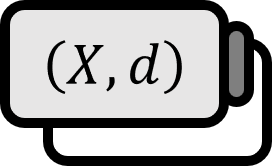Topological Isomorphism in Metric Spaces
Definition
Given two metric spaces $\left( X, d_{1} \right)$ and $\left( Y, d_{2} \right)$, if there exists a bijective $f : X \to Y$ such that both $f$ and its inverse function $f^{-1}$ are continuous functions, then $f$ is called a homeomorphism, and the two metric spaces are said to be homeomorphic.
Explanation
The definition of homeomorphism for metric spaces might seem vacuous at first glance. Indeed, since metric spaces are sufficiently nice spaces, and demonstrating that two metric spaces are homeomorphic simply requires explicitly showing a bijective function that meets the condition. From the learner’s perspective, it feels more like getting accustomed to the terminology in anticipation of a generalization to topological spaces.
Properties
Let’s assume that $d_{1}$ and $d_{2}$ are distances defined on $X$. If for every $x, y \in X$, there exists $c,c ' >0$ satisfying both $d_{1} (x,y) \le c d_{2} (x,y)$ and $d_{2}(x,y) \le c ' d_{1} (x,y)$, then the identity function $1_{X} : \left( X, d_{2} \right) \to \left( X, d_{1} \right)$ is a homeomorphism.
Proof
Since the identity function $1_{X}$ is trivially a bijective function, it suffices to show that both $1_{X}$ and $1_{X}^{-1}$ are continuous. Given $\varepsilon > 0$ and $a \in X$, let’s consider $\displaystyle \delta := {{\varepsilon} \over {c}}$. Then, for all $x$ such that $d_{2} (x,a) < \delta$, the following is true:
$$ \begin{align*} d_{1}(1_{X} (x), 1_{X} (a)) =& d_{1} (x,a) \\ \le & c d_{2} (x,a) \\ <& c \delta \\ =& \varepsilon \end{align*} $$
Therefore, $1_{X}$ is a continuous function and, given $1_{X} = 1_{X}^{-1}$, satisfies the conditions for a homeomorphism.
■
This property serves as a theorem analogous to norm equivalence, and is worth noting at least as a fact.
